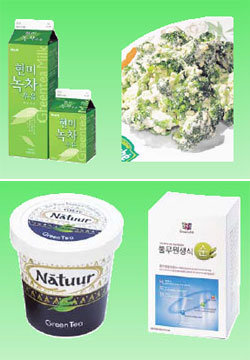Food-A Green Wave of Beverages
Food-A Green Wave of Beverages
Posted June. 07, 2004 22:37,

The beverage industry is riding a green wave.
Green vegetable juices and raw living recipesformerly considered novelty health foodsare becoming more popularized due to a growing rage for well-being. Even dairy products seem to need green tea leaves or powder added in to draw consumers attention. Restaurants and fast food eateries are also focusing on broccolis and other green vegetables for their main fare, instead of simply using them for garnish.
Green Health Food
Pulmuone Health & Living has recently renewed their living food product, Pulmuone Saengsik Sun(純) (saengsik means raw food in Korean), which contains multiple grains and fruits, as well as green vegetables. Its list of ingredients includes such nutritional elements as brown rice germ, germinated brown rice, 40-some fruits, fermented vegetable extract, and broccoli extract. Pulmuone explains that the product activates the livers anticancer enzyme to facilitate detoxification, and reduces toxins like heavy metals and carcinogens. 260,000 won/set.
Pulmuone Greenjuice sells green vegetable juices tailored specifically for men or women. Cheongnyeon Sidae (meaning Youth Age), with a retail price of 39,000 won per one months supply, targets men, who are prone to vitamin and calcium deficiencies due to stress, exhaustion, and alcohol consumption. Aloe Plus is designed to promote womens skin health and beauty, and costs 60,000 per month.
Green Foods on the Rise
Dongwon F&B recently put out the Deli Cochon Nokdon Ham. Nokdon (or green pork) comes from pigs that have been fed fodder with green tea leaves mixed in, and Dongwon uses quality tea leaves grown in Boseong, Jeanlanam-do.
The Deli Cochon Nokdon Ham is premium-grade, made with 100 percent domestic nokdon and containing no starch or preservatives. Nokdon is also known to contain less cholesterol and fat than regular pork. The price ranges from 1,500 to 5,600 won according to weight.
Dongwon F&B is also marketing Tasty Noodles Made with Boseong Green Tea. It uses aluminum packaging to preserve the aroma of green tea for a longer period, and has a price tag of 1,500 won/300g.
Meanwhile, the dining industry is incorporating broccolis into the main menu, for their high vitamin C, vitamin E, and iron content.
Marché introduced the Tofu and Broccoli Salad, which has been popular with young women. The salad combines gently-cooked tofu and fresh broccoli, and costs 1,490 won/100g.
Mr. Pizza came up with the Feta Rainbow pizza, topped with large chunks of broccoli and shrimp. It is said to contain fewer calories and to leave a cleaner after taste than pizzas topped with beef or bacon. 18,900 won (regular size) to 26,900 won (large size).
Green Dairy Products
Maeil put out the Maeil Brown Rice & Green Tea Milk, containing germinated brown rice, on June 7. According to Maeil, the new product mixes powdered green tea with germinated brown rice (rich in vitamins, minerals, and dietary fiber) and low-fat milk, for a more active nutritional value. In addition, powdered green tea allows the consumption of nutritional elements normally lost when the tea is strained in water. The price runs at 500 won for 180mL and 1,800 won for 930mL.
Korea Yakults spring addition, Gidarim (the Korean word for waiting given a new twist by using the Chinese characters for chi, tea, and forest) harmonizes the aroma of green tea with the savory taste of buckwheat. The buckwheat used in Gidarim contains over 100 times more lutinwhich lowers cholesterol levels, blood pressure, and blood sugar, and is good for diabeticsthan regular buckwheat. 600 won (180mL can), 2,000 won (1.5L bottle).
In-Jik Cho cij1999@donga.com







